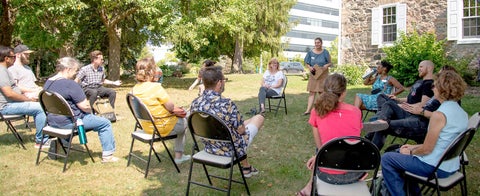
During orientation week this year, master’s students in Peace and Conflict Studies (MPACS) and Theological Studies (MTS), plus faculty and staff at Conrad Grebel University College were invited to participate in a tour of the Brubacher House Museum on the University of Waterloo campus, followed by a virtual tour of the former Mohawk Institute Residential School, offered by the Woodland Cultural Centre. Participants were encouraged to stay afterward to discuss anything that may be coming up for us after these two tours.
What resonated for me is that there is a real effort being made to educate people on the true history of the land we live and study on. Every time I engage in topics surrounding Truth and Reconciliation, I learn something new that changes my perspective on how I engage with the land and people around me.
The University of Waterloo sits on the Haldimand Tract, and this land acknowledgment gets thrown around ubiquitously, but what does it really mean? What does it mean that the Brubacher House – a restored 1850s Pennsylvania German Mennonite farmhouse – sits on lands that were promised to the Six Nations? It is important for students at Grebel to understand the history of the lands they live, work, and learn on. And there have been, and continue to be, people who have been stewards of these lands since time immemorial. There is a special and inexplicable power that comes from being connected to place, and to community. How do we build good relationships if we do not know the stories and histories of the land we walk on every day?
As a graduate student in Peace and Conflict Studies, it is crucial that I unpack my own internalized colonialism and continue to learn from and with Indigenous people. This is an infinite, and at times, uncomfortable process, because I must reconcile that the settler culture I belong to has caused, and continues to cause, harm towards Indigenous people. We need truth before we can repair. We need to create space for authentic stories and relationships to bloom. And there must be some sort of understanding that this is an ongoing process. It is never too late to start learning, or to continue learning with humility and openness.
By Madeline Docherty, Master of Peace and Conflict Studies Student